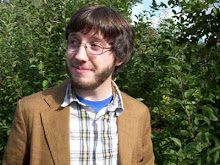I'd never read Barbara Kingsolver before (even though The Poisonwood Bible is supposed to be excellent), but when I heard about her most recent novel The Lacuna
, it sounded like something I had to check out. I originally bought it as a Christmas present for my girlfriend, who is a big fan of Frida Kahlo, a major character in the book, and she raved about it.
The story moves from Mexico after the first World War to Washington, DC during the Bonus Army era, back to Mexico for Frida's rise to fame and visit from Trotsky, and finally back to America in the wake of his murder, where the protagonist comes under investigation by the House Un-American Activities Committee. It's a whirlwind plot, all centered around a character named Harrison Shepherd, a writer who began as a cook in Mexico and came to work for the U.S. State Department, transporting paintings during World War II. Kingsolver doesn't tell the story in the usual way, though: the story is presented through journal entries, letters, newspaper clippings, and archival notes that record Harrison's journey around the continent. Through this method, she presents a character whose internal world is constantly hidden away from his public life.
The title of the book describes this disconnect, and the word "lacuna" is used throughout the novel in a variety of ways. The first is simply a cave in a cliff: a missing piece that Harrison follows as a child to discover a tucked-away Aztec ruin. But it also means a missing piece of a manuscript, and in the case of Harrison, it's a missing notebook that documents Harrison's expulsion from school (for "improper acts" with another boy). Throughout the book, the idea of the lacuna appears in a variety of ways: letters between characters where the reader only sees one half of the conversation, or a statement made over and over that the most important piece of a story might be the piece that's left out. In trying to reconstruct his life through his letters and diaries, Harrison's stenographer, Violet Brown, hopes to fill in that piece.
This is an unabashedly political novel, as much about Communism and World War II as it is about art and fiction. In fact, the driving force is how these things become intertwined. It's Harrison's association with Frida Kahlo and Diego Rivera that initially exposes him to Communist ideas, and the same association that brings him to work for the State Department, moving artwork from Washington, DC to Asheville to keep it from being destroyed during the war. And it is in part the same association that brings him under scrutiny during the Communist "witch hunt": When Harrison becomes a well-known novelist, his history in Mexico is discovered, as is his association with Trotsky and Rivera. By the time his trial is underway, it doesn't matter that Trotsky opposed Stalin. All Soviet Communists (in the eyes of the committee) are the same. The politics in the novel aren't contained to history, though, and there was a great line about how the radio made it so that the loudest talkers, and not the most knowledgeable, ended up finding the widest audience. If this isn't Kingsolver calling out pundits, I don't know what is.
The format, telling the story in a less direct way, is risky, and for this book, it pays off. Considering how important the public portrayal of Harrison becomes as the novel goes on, approaching from the viewpoint of his diaries, intermingled with real newspaper clippings, embedded the story in the real world as well as his emotions. And getting a lot of the story told in Harrison's voice makes for a really engaging read. I think it's a challenging feat to pull off, and there's a chance your readers will lose the plot between journal entries, but I think Kingsolver is a talented enough writer to give you the story that lives in those gaps, and I think that's what this book is really about.
Monday, August 9, 2010
Fiction Mondays: The Lacuna
Labels:
Books,
Fiction Mondays
Subscribe to:
Post Comments (Atom)

No comments:
Post a Comment